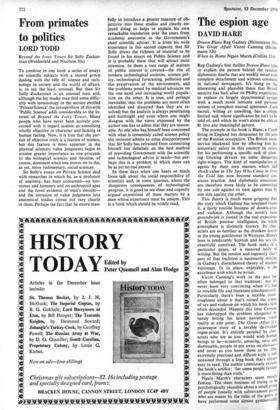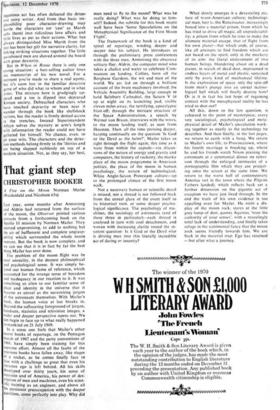The espion age
DAVID HARE
Drawn Blanc Reg Gadney (Heinemann 30s) The Great Affair Victor Canning (Heine. mann 32s) When in Rome Ngaio Marsh (Collins 25s) Reg Gadney's first thriller Drawn Blanc tries to explain the pattern behind the random diplomatic deaths that are weekly noted with complete detachment and without comment in national newspapers. It's hung on the interesting and plausible thesis that British security has had, after its Philby experience: to replace its largely departmental system with a much more intricate and personal system of complete mutual ignorance. Each recruit, willing or unwilling, has a simple limited task whose significance he isn't to be told of, and which he won't alone be able to fit into any meaningful pattern.
The example in the book is Blanc, a Czech living in England but threatened by the arm of the Russian occupation. The British secret service blackmail him by offering him his temporary safety in this country in return for his performing a specific task of plant- ing listening devices on some dangerous right-wingers. The kind of manipulation of agents by their own masters which had shock-value in The Spy Who Came in from the Cold has now become standard con- scious practice. And diplomatic executions are therefore more likely to be committed by one side against its own agents than by one side against the other.
This theory is much more gripping than the story which Gadney has wrapped round it, a fairly routine business of double-cross and violence. Although the novel's basic groundwork is rooted in the real experience of British postwar intelligence, its whole atmosphere is distinctly literary. Its char- acters are as familiar as the drunken doctor or the young gunthrower in Westerns. Blanc 's boss is predictably Scottish and his sex life cheerfully contrived. The book reeks of a particular genre, of a received body of writing. But the tension and ingenuity that's part of that tradition is necessarily missing in Gadney's disenchanted theory of modern espionage. In its place, enjoyably, is the excellence with which he writes.
Victor Canning's work in the past has often belonged to that tradition: but it's never been very convincing when its had to straddle life and literature simultaneously. Particularly there's been a terrible mock- toughness about it that's ruined the scenes of sex and violence on which his books have often depended. Happily this time Canning has sidestepped the problem altogether by barely letting his latest narrative touch reality at any point. The Great Aflair is a picaresque story of a lovable de-frocked rogue-priest. It's entirely peopled by char- acters who are as you would wish human beings to be—eccentric, amusing, terse and dismissable, people to put away on shelves— and never as you know them to be. This extremely practised and difficult style is well sustained through a long book that's always easy to read. The author consciously excuses the book's artifice: 'for some people fantasy is more fitting than truth.' Ngaio Marsh's characters seem mostly fantasy. The sheer business of trying to be psychologically plausible about a small group of people (usually with subterranean pasts) who are meant by the rules of the genre to have performed some almost gymnastically ingenious act has often defeated the detect rive story writer. And from that basic im- plausibility poor character-drawing may hurtle the characters (or 'cast' as Marsh calls them) into ridiculous love affairs and little lives as pat as their actions. What has always distinguished Miss Marsh from the rest has been her gift for narrative clarity, for linking striking situations together. The little pasteboard men are shoved around the board with great dexterity.
But in When in Rome there is only one ctrong situation: a best-selling author loses the manuscript of his new novel. For a moment you're made to share a real agony, but it's soon lost in the familiar detective game of who did what to whom and in what order. The mixture here is grudgingly up- dated and a toe is dipped into depraved Roman society. Debauched characters who have touched depravity or been near it
wander through the book like shellshock victims, but the reader is firmly denied access
to the trenches. Instead Superintendent Alleyn solves the mystery at arm's length ssith information the reader could not have
gathered for himself. No chance, even, to
pit your wits. The characters and the detec- tion methods belong firmly to the 'thirties and are being slapped ruthlessly on top of a modern situation. Not, as they say, her best,











































 Previous page
Previous page